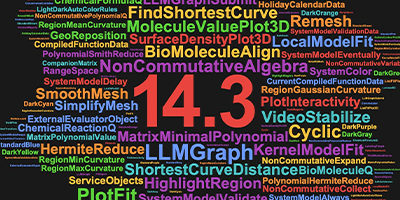11th International Mathematica Symposium Call for Submission
It is no secret that Mathematica has a big user community that is alive and kicking. It may, however, surprise you that the global user community has successfully organized 10 international Mathematica conferences around the world. It all began 20 years ago in the city of Rotterdam, the Netherlands, about two meters below sea level, where Wolfram Research had organized the Mathematica Days. The Mathematica Days were a small sibling of the larger annual Mathematica Conference, which in those days had its venue 8,800 km farther west in the Bay Area. Among the participants in Rotterdam were Peter Mitic (The Open University, UK), Gautam Dasgupta (Columbia University, New York), Pertti Näykki (Finland), Klaus Sutner (Carnegie Mellon University, Pittsburgh), Robert Kragler (Fachhochschule Ravensburg, Weingarten, Germany), and Veikko Keränen (Rovaniemi Institute of Technology, Finland). Most of them met for the first time and came from different walks of life, but they all shared the same enthusiasm for algorithmic mathematics. The lack of an academic conference targeting innovative work in, with, and about Mathematica triggered Peter Mitic to propose the idea of a symposium. His new friends very much supported the endeavor, and in 1994 Stephen Wolfram became the godfather of the new event by suggesting the name “International Mathematica Symposium” (IMS).
In July 1995, the first IMS in Southampton, England, began an uninterrupted streak of biannual, and for some years even annual, symposia. In contrast to the Wolfram Developer/Technology/User Conferences with their venue in Champaign, Illinois, the IMSs have roamed the world. The second IMS took place in Rovaniemi near the polar circle in northern Finland, followed by Hagenberg near Linz in Austria, Tokyo in Japan, London—the one in England, Banff in Canada, Perth in western Australia, Avignon in the south of France, Maastricht in the Netherlands, and Beijing in China.
For a visualization of the IMS tour around the world, press Play to start the animation in the CDF below or download a high-res version:

Exciting venues have become a hallmark of IMS. No complaints about the Champaign Hilton, but can it compare to the Palace of the Popes in Avignon? Is there a better way to celebrate the 20th anniversary of Mathematica than in the caverns of Geulhem near Maastricht? Where can you learn about exciting Mathematica novelties during the day and taste crunchy grasshoppers in the evening? Just to point out some highlights of the last three IMS sites!

IMS venue 2006: Palace of the Popes, Avignon, France
It would be superficial and vain to characterize IMS merely by its extravagant venues. Upfront, I should mention the hardworking people that make IMS possible. These enthusiastic Mathematica users organize the symposia in their spare time. Find a list of past IMSs and their organizers via InternationalMathematicaSymposium.org. This website also provides links to past IMS e-proceedings and programs, giving you an impression of the wide range of exciting contributions. Note that the symposia are not confined to just one topic. Anything done with Mathematica is eligible, ranging from “Waterslide Design” to the “Network Structure of Supreme Court Jurisprudence.” Nevertheless, every IMS organizer has the freedom to emphasize a few themes, thus giving every IMS its own spin.
So, what can we expect at the upcoming IMS 2012 taking place at University College London 11–13 June?
Professor William Shaw is organizing and hosting the event. His expertise is mathematics and the computation of financial risks. Consequently, it is no surprise that finance is one of the special topics at IMS 2012. The current global financial crisis makes this theme very popular.
The release of the Computable Document Format (CDF) by Wolfram Research and the recent development of ebooks and ebook content have lead to another focus summarized under the title “Mathematica in Education.”
Furthermore, Mathematica 8 features GPU and grid-programming. Hence, contributions containing GPU and grid applications are most welcome.
Last but not least, William is going to pay tribute to a historic event by organizing a Turing Session commemorating the centenary of the birth of Alan Turing. For this session he has invited an exquisite list of guest speakers: Sir John Dermot Turing, Dr Andrew Hodges (author of Alan Turing: The Enigma), and Professor Sir Roger Penrose.
Are you ready to contribute to this exciting event? If you have done interesting work in Mathematica that you would like to publish as a scientific paper and/or present in a short talk, please consider IMS 2012 and submit an abstract for review by March 23.
You do not have to contribute in order to attend. As a matter of fact, newcomers to Mathematica are also welcome to join the global IMS family. For this purpose, we offer a complimentary introduction to Mathematica the day before the symposium. During the conference, Wolfram Research employees will give insight into current developments, and the more seasoned Mathematica user may fancy one of the optional, post-conference workshops and special training sessions.

IMS 2010 at Tsinghua University, Beijing, China, organized by Professor Ben Koo
Please book well in advance. You may recall that there is another major event in London later this year!



Hi Markus
A very nice – and illustrated – IMS history. Snaring Roger Penrose for the Turing day is incredible; I had booked my flights months ago, but now I’m *really* excited! Many thanks to William Shaw and all those behind IMS 2012 – I know there is always a lot of paddling underwater that IMS attendees never really see.
Cheers
Barrie
Hi Markus,
great story!
I am contemplating to join again after 20 years IMS-abstinence. But before submitting an abstract I would like to know costs and conditions (e.g., is there a conference waiver or reduction for speakers, etc.). But on the website there still is this
“The registration site will be online soon.”.
How soon?